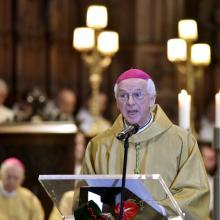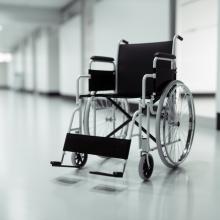Euthanasia

Archbishop Terrence Prendergast.
Image via Paul Haring/Catholic News Service/RNS
A leading Canadian Catholic churchman has said that a person who plans to die through assisted suicide can be denied last rites by a priest, a view that may spark debate as assisted suicide laws proliferate and pastors are presented with a new moral quandary. The bottom line, said Ottawa Archbishop Terrence Prendergast, is that a Catholic who requests assistance in dying “lacks the proper disposition for the anointing of the sick,” as the sacrament is formally known.

Arcchbishop Jozef De Kesel. Image via REUTERS/Eric Vidal/RNS
Belgium is embroiled in a religious freedom controversy after the new head of the country’s Roman Catholic Church demanded that faith-run hospitals and nursing homes have the right to refuse euthanasia to patients.
A 2002 law decriminalized euthanasia for terminally ill adults and it has the support of a large majority of public opinion and politicians. But opposition in this historically Catholic country has grown as lawmakers extended the practice to including terminally ill children and people with severe psychological problems.

Image via Chromatika Multimedia snc/Shutterstock
A bill to legalize physician-assisted suicide passed the California state assembly Sept. 9., according to MSN News.
Senator Bill Monning, one of the bill's backers, described the bill's passage as "a historic step forward."
MSN News reports,
The measure, approved by 43 votes against 34, is expected to be adopted by the state senate this week.
More than a dozen states, plus the District of Columbia, are considering controversial medically assisted death legislation this year.
The laws would allow mentally fit, terminally ill patients age 18 and older, whose doctors say they have six months or less to live, to request lethal drugs.
Oregon was the first state to implement its Death with Dignity Act in 1997 after voters approved the law in 1994, and four other states — Montana, New Mexico, Vermont, and Washington — now allow for medically assisted death.
As of April 10, at least another 25 states have considered death with dignity bills, according to Compassion & Choices, a Denver-based nonprofit organization that advocates for these laws. Some of those bills already have died in committee.
“The movement has reached a threshold where it is unstoppable,” said President Barbara Coombs of Compassion & Choices, who was also chief petitioner for the Oregon Death with Dignity Act.
The issue of medically assisted death rose to prominence last year with the case of Brittany Maynard, 29, who was told she had six months to live after being diagnosed with brain cancer. Maynard was a strong advocate for Death with Dignity, and when she learned of her grim prognosis, she moved from her home state of California to Oregon where terminally ill patients are allowed to end their own lives.
“I would not tell anyone else that he or she should choose death with dignity,” she wrote in an op-ed on CNN.com.
“My question is: Who has the right to tell me that I don’t deserve this choice? That I deserve to suffer for weeks or months in tremendous amounts of physical and emotional pain? Why should anyone have the right to make that choice for me?”
The 77-year-old pontiff is well-known for his attacks on consumerism and for his compassion for the poor. More recently, Francis has turned his attention to bioethics issues, describing abortion, embryonic stem cell research, and euthanasia as “playing with life” and “a sin against God.”
But this was the first time he has delivered his message on the floor of the parliament of the European Union, which represents 500 million people across 28 countries.
As the first non-European pope to hold the office in almost 1,300 years, Francis also appeared less willing to continue the Roman Catholic Church’s traditionally unconditional support for the EU.
As the impact of the stifling economic crisis is being felt in European countries like France and Italy, Francis attacked the EU for a dearth of leadership, saying its ideals had become weighed down by bureaucracy.
“The great ideals that inspired Europe seem to have lost their power of attraction, in favor of the bureaucratic, technical emphasis of its institutions,” the pope said.
JAMES DOBSON and Kurt Bruner get three things right in their recent novels Fatherless and Childless: Euthanasia is wrong, married couples should make time to have hot sex, and stay-at-home moms should get some respect.
Pretty much everything else in the novels, the first two-thirds of a trilogy (book three, Godless, is due out in May 2014), is way off and internally incoherent. The plot starts in 2042, when an aging population and economic malaise have motivated the government to legalize euthanasia. Businessman Kevin Tolbert, recently elected to Congress, lectures his peers about the need to stop euthanasia and encourage parenthood in order to revive the economy. His wife Angie’s high school friend Julia Davidson, an allegedly progressive and feminist reporter, is assigned to write a story about him (lecture alert). Meanwhile Kevin and Angie struggle (with mercifully few lectures) with their third child’s diagnosis of Down syndrome. Subplots deal with a disabled teen and an elderly dementia victim who turn (or are pushed) to euthanasia.
Actual euthanasia, as disability-rights groups such as Not Dead Yet have documented, often turns on society defining “dignity” according to physical ability and health instead of the innate value of a human being. These novels, however, ask us to believe the main impetus for euthanasia would come from the drive to reduce the federal deficit, to deal with “swelling entitlement spending.”
What spending? The novels’ elderly and disabled characters are drawn or pushed toward euthanasia because of family financial troubles: There is no mention of any Social Security, Medicare, or Medicaid help going to any of them.
For Catholics—and many others—what happens in Rome doesn’t stay in Rome. The seating of a new pope has the power to affect believers across the globe, in ways direct, indirect, and unpredictable. And when a surprising sea change occurs in a hide-bound, steeped-in-tradition place like the Vatican—the unexpected resignation of a pope, the selection of a Jesuit from the Americas as his replacement, and the powerful symbolism of a new leader who literally stoops to wash a Muslim woman’s feet—people of faith of all traditions sit up and take notice.
In these early days of Francis’ papacy, we asked three prominent Catholic thinkers and leaders to help us understand what it all might mean. How will the spirit of reform that has marked Pope Francis’ first few months in office affect the worldwide church? Will change at the top trickle down to parishes and neighborhoods here in the United States and elsewhere? And what will Francis’ leadership mean not only for Catholics, but for all people of faith engaged in the work of making justice and building peace? —The Editors
CATHOLICS AROUND THE WORLD are transfixed by Pope Francis. We love his simplicity of life, his humble faith, his welcoming attitude to all, and his way of being Christian in the contemporary world that takes its bearings from the poor. Lace and gilt are no longer fashion statements at the Vatican. From his small apartment, the pope speaks bluntly about worrying less about rules and more about love. An utterly refreshing breeze blows through the Catholic Church.
But what does it really mean for Catholics today? The church still reels with the moral and spiritual damage done by members of the clergy as perpetrators or accomplices in the sex abuse scandals, from fiscal mismanagement, and from institutional infighting. Does Pope Francis change that? And what does the new pope signify for the young, for women, and for the many issues that vex the church’s engagement in today’s world?
PORTLAND, Ore. — Peter Goodwin, the first doctor in Oregon to campaign publicly for the terminally ill to obtain medical help in ending their lives, died shortly after exercising the right he fought to secure. He was 83.
Goodwin's four adult children and their spouses surrounded him in his apartment when he took a planned overdose of a prescribed drug on Sunday (March 11).
He died less than 30 minutes later, said Steve Hopcraft, a spokesman for Compassion & Choices of Oregon.
Goodwin, a retired professor of family medicine at Oregon Health & Science University, was diagnosed six years ago with a rare neurological disorder called corticobasal ganglionic degeneration, which is similar to Parkinson's disease but has no treatment or cure.
He spent his last weeks talking on the phone with friends and accepting brief visits from longtime comrades. He said the Death with Dignity Act was his most significant public legacy because passage prodded medicine to improve palliative and hospice care of the dying.
In her generally fine article, Lisa Sowle Cahill states, “euthanasia or physician-assisted suicide is not an acceptable answer to the stress of human death.”
Oregon voters approved Measure 16, becoming the first state to permit physicians legally to prescribe lethal medications to terminally ill persons who have less than six months to live.


